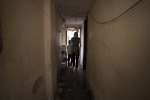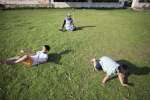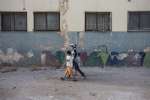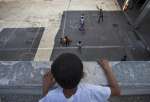- Text size
 |
|  |
|  |
| 
- Français
Denmark's Crown Princess Mary visits UNHCR headquarters
News Stories, 13 May 2008

GENEVA, May 13 (UNHCR) – Denmark's Crown Princess Mary on Tuesday made an official visit to UNHCR headquarters in Geneva, where High Commissioner for Refugees António Guterres praised her country's global engagement in the refugee cause.
The Australia-born princess, dressed in a dark trouser suit, received a red-carpet welcome at midday in UNHCR's seven-storey atrium. She received flowers from three Danish children – Simon, 4, Astrid, 6, and Mathilde, 8, whose father Morten Ussing is a UNHCR staffer seconded to UNAIDS.
She spoke in Danish to the children and their mother before posing with Guterres for photos in front of the UN and Danish flags. Another group of children waved Danish flags as UNHCR staff looked on from the lobby and galleries above.
"It is my great pleasure to welcome you to UNHCR," Guterres told the princess during an introductory meeting in his office. "Denmark has a very long tradition of asylum ... and is a very relevant partner in refugee work worldwide."
The High Commissioner noted the very strong "strategic partnership"; between UNHCR and the Danish Refugee Council, of which the princess is a royal patron. "You can be very proud of the work of Danish volunteers and civil society – they are brave, committed and effective," he said. "Denmark is one of our most relevant partners."
Guterres presented the princess, who also expressed an interest in the legal aspects of the agency's work and the 1951 Refugee Convention, with a UNHCR publication, "Refugee Protection in International Law."
Noting the difficult challenges posed by migration, climate change, environmental degradation, conflict and displacement, Guterres said the 21st Century "will be a century of people on the move" presenting complex protection problems.
Following a working lunch, the princess was given a series of informal briefings by senior UNHCR staff from the Department of International Protection Services, the Regional Bureau for Africa and the Division of Operational Services, which gave a demonstration of the agency's emergency room operations.
In addition to UNHCR's emergency and technical work, the briefings focused on international refugee protection, resettlement, internal displacement, durable solutions for refugees and children at risk.
At the end of her four-hour visit, Guterres showed Princess Mary the agency's two Nobel Peace Prizes displayed in a glass case in the atrium, before escorting her to her vehicle. "It really was a valuable experience," she said.
Aside from the Danish Refugee Council, Princess Mary is also royal patron of a number of other charities in Denmark that focus on health, children's welfare, diversity and refugee issues. She has established The Mary Foundation, which seeks to encourage tolerance of diversity and to improve lives compromised by environment, heredity, illness or other circumstances which can isolate or exclude people socially.















